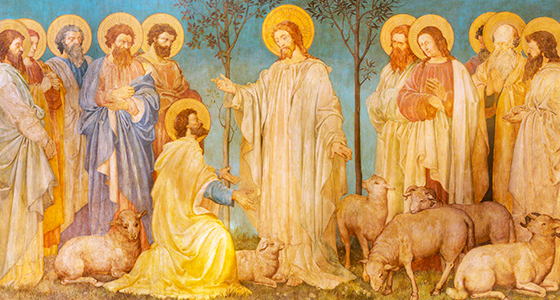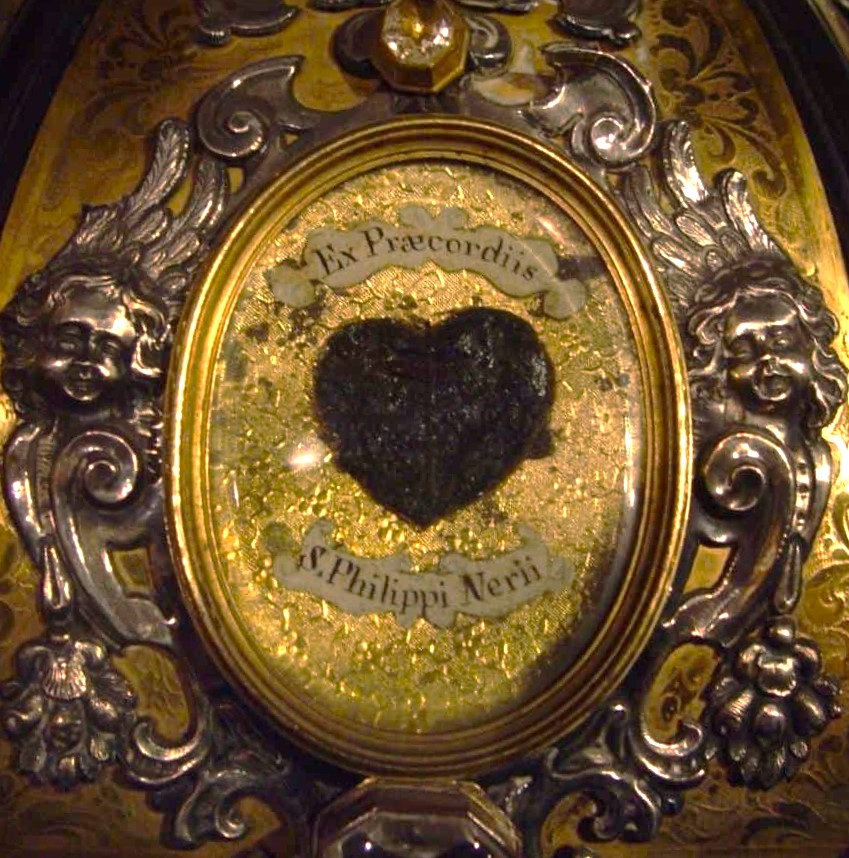A Reading from the Holy Gospel According to John:

After Jesus had revealed himself to his disciples and eaten breakfast with them, he said to Simon Peter, “Simon, son of John, do you love me more than these?” Simon Peter answered him, “Yes, Lord, you know that I love you.” Jesus said to him, “Feed my lambs.” He then said to Simon Peter a second time, “Simon, son of John, do you love me?” Simon Peter answered him, “Yes, Lord, you know that I love you.” He said to him, “Tend my sheep.” He said to him the third time, “Simon, son of John, do you love me?” Peter was distressed that he had said to him a third time, “Do you love me?” and he said to him, “Lord, you know everything; you know that I love you.” Jesus said to him, “Feed my sheep. Amen, amen, I say to you, when you were younger, you used to dress yourself and go where you wanted; but when you grow old, you will stretch out your hands, and someone else will dress you and lead you where you do not want to go.” He said this signifying by what kind of death he would glorify God. And when he had said this, he said to him, “Follow me.”
The Gospel of the Lord.
Transcription of Sermon
Today we celebrate the feast of the great Roman Saint, Saint Phillip Neri, and it’s fitting that we do this right before the Feast of Pentecost. He was certainly a docile instrument of the Holy Spirit.
He was born into a rather well-to-do family, had a good education. As a child, he grew up in Florence, Italy, and was a very good student of great docility to his parents. That was one of the things that he strove to be as a little boy was perfectly obedience to his parents. Upon finishing his studies at the age of 18, was scouted by a businessman who saw in him great intellect and a great disposition – somebody who would be able to carry the business forward. And so, he thought, “I’ll take him under my wing, show him the ropes, and then, at the proper time, pass off the business to him.” And, Filippo Neri was obviously very overjoyed with this prospect of having, well, his future already made for him.
And it seemed like everything was going to work out materially well for him, but he had an encounter with Our Lord who appeared to him and wanted him to occupy himself with other business; the business of Our Lord. And, he wasn’t exactly sure what shape that would take. He went from San Girolamo where he was working, left the business, went to Rome, and there began, for a while, catechizing people on the street. He was a street evangelist. This is really something of an anomaly at the time. This wasn’t something done in those times as a layman. [It] was very odd for a young man who was so filled with love of Christ that he couldn’t hold it within himself.
In fact, we have a good number of ecstasies and mystical experiences, one of which was the expansion of his heart. We see this in the lives of certain mystics where there’s a transformation of the heart. Sometimes there’s a stigmata on the heart. In his case, it was an expansion of the heart; symbol of how the Holy Spirit had overfilled his heart. So much so, that after his death, they noticed that there was this protrusion on his sternum, and he had several broken ribs as a result of the expansive heart that was so filled with the love of the Holy Spirit.
He began to study philosophy, and then theology, and he only studied for three years and said, “I don’t think this is God’s will.” But after a number of years of gathering young people around him and forming them in the faith, of being a clear, spiritual, intellectual leader for many people, and he was a sought after a counselor by homeless people, by cardinals, by bishops by religious, his confessor said, “It’s really God’s will for you to be a priest and I suggest you study.” So, he went to Sapienza and studied.
He finished his theological studies there, was ordained, and started to work in, obviously with this change of character, with a priestly character now impressed on his soul, his apostolic took off.
And this was at a time of great malaise in Rome when, under the tragedy of the Reformation that was running across Europe, this brought the heaviness on the city of Rome. And when people are in distress or sorrow, they are faced with a choice, do I want to embrace the cross or do I find my satisfaction in something less than Christ? And so, sadly, many of the clergy chose to be worldly. Many of the Catholics, as a result, weren’t catechized. You can’t love what you don’t know and so, not knowing the fullness of the truth of the Catholic Church, many became indifferent about it.
And Philip set about to change that by forming cells of people who would not only be recipients or consumers of grace but also become multipliers. In other words, they were formed in order to form others. And he did this in the context of all sorts of human spiritual intellectual formation. And he started these groups who would study sacred music, they would study rhetoric, they would study apologetics. They studied in these what he called orators and this was the beginning of the Oratory itself, which now is a great Congregation.
He had a good number of mystical experiences, which he often tried to hide from people; wasn’t always successful. He was rather embarrassed when people flattered Him for His holiness, and he tried his best to dispel that consideration through acting like a drunk and doing all sorts of things that were a little unbecoming in order to not make people focus on him. I don’t know how successful he was in that.
Nonetheless, he had a great sense of humor, and it was precisely through his humor, and his self-effacement, that he was able to win many people over for the truth of Christ. He opened their hearts through his good disposition, which was natural, and then, with grace, supernatural. His humor, his humility, nobody’s really threatened by a humble person, and nobody felt threatened by him. And nonetheless, he was a leader and because he was such a clear leader, such a good educator, and was a man with a mission, who saw clearly what he had to do, people followed. People followed, and the fruits are still to be seen today in the many Oratories around the world, these oratories of his congregation, the Oratorians.
He is the patron saint of comedians. He’s also the patron saint of the Green Berets, the Special Forces.
In the name of the Father, and of the Son, of the Holy Ghost. Amen.

